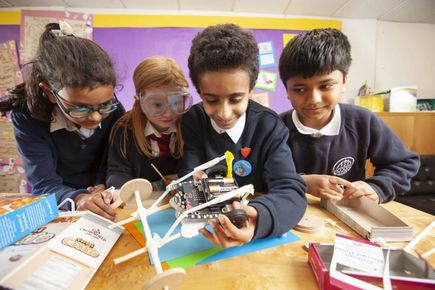Digital Xtra Fund
Digital Xtra Fund aims to give every young person in Scotland access to digitally creative activities, regardless of their gender, background, or where they live.

More than half of Scotland’s local authorities struggle with a lack of resource to teach computer science in secondary schools, resulting in courses sometimes being reduced or dropped. To help counteract this, Digital Xtra Fund provides grant awards for exciting initiatives which inspire young people to understand and create with technology, not just consume it.
Grant recipients
As part of the 2017-18 Digital Xtra Fund grant awards, the Micro:bit Educational Foundation donated 1,200 micro:bits to initiatives in Scotland which focus on extracurricular digital skills. An additional 2,000 devices were then donated in 2020.
Some of the programmes supported by Digital Xtra Fund which also receive micro:bits include Apps for Good, Inverness Science Festival, McLaren High School, CodeBase Stirling, The Prince’s Trust, and West College Scotland.
These programmes offer some examples of how micro:bits and support from Digital Xtra Fund are making a difference to young people in Scotland. Funding and hardware, which are offered in twice-yearly funding cycles, are provided to initiatives in grants of £5,000 each. Recipients of funding share a demonstrable ability to engage, inspire and enable young people and while showcasing the huge variety of careers digital skills can open up for them.
These and many other initiatives which receive Digital Xtra Fund grant awards are enabled to deliver outreach initiatives across Scotland which seek to engage young people with digital technology.
Some initiatives supported by Digital Xtra Fund
Apps for Good teaches young people how to build and launch digital tools and solutions to address local issues in school and the community:
- micro:bits were distributed to nine schools across Scotland undertaking a course focusing on the Internet of Things which explores the benefits and potential issues, as well as the technology which powers IoT devices
- Practical activities covered include building circuits using sensors which help students to form connections with the abstract concepts behind the technology
- Resources are based on the micro:bit and Arduino and schools retain the hardware once the course is complete, enabling future expansion on the course material and cross-curricular usage in other subjects
West College Scotland engage young people with the micro:bits through coding clubs at Renfrewshire primary and secondary schools:
- To support the set-up of the clubs, teachers participated in a training session focused on increasing their confidence and encouraging the use of coding in the classroom, with each teacher receiving a set of micro:bits for use in their schools
- The training sessions were delivered in partnership between Microsoft, Renfrewshire Council and Paisley YMCA. Digital Xtra Fund said, "this training is vital to creating a strong ecosystem of computing activities in Renfrewshire as these teachers will now manage the current coding clubs as well as initiate new ones with the assistance of STEM Ambassadors and senior school pupils."
Outreach programmes
Some of the most recent recipients include the University of Highlands and Islands (UHI) who will be developing a 'Lend a lab' digital resource box, Edinburgh Science who establish a STEM careers network, in addition to funding for a wide variety of outreach programmes and code clubs in a range of schools across Scotland, including Balmalloch Primary School, Moray College UHI and Rayne North School.